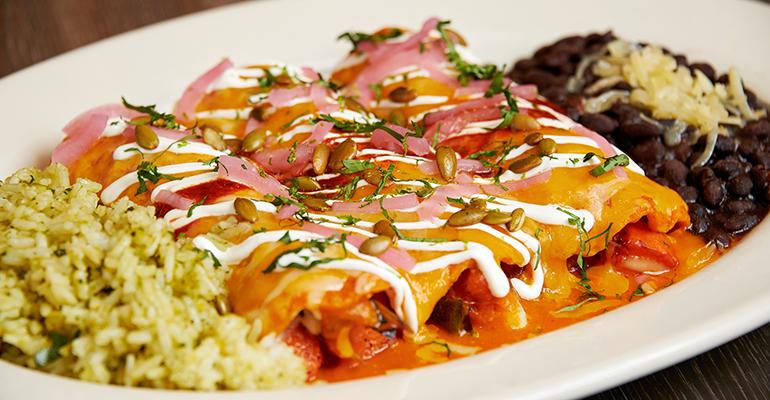As menu R&D ramps back up in the post-COVID environment, many restaurateurs find themselves in a tough spot, caught between labor shortages in the back of the house and rising patron expectations in the front. To address the challenge and add a little luster to menus, seasoned operators are looking to the condiment category as a way to make meals memorable without overtaxing the kitchen. Condiments, dressings and sauces have long been among the most reliable culinary workhorses: versatile and cost-effective, they add maximum pizzazz with minimal kitchen disruption.
Premium approaches. Restaurateurs frequently use condiments to add an upscale touch to standard menu items — a practice that picked up steam going into 2021. A number of chains embraced the truffle: the prized fungus synonymous with luxury. Buffalo Wild Wings introduced the Truffalo Sauce in March: a winter special made with white truffles and available for $1 extra on any chicken wing order. Shake Shack launched a trio of premium burgers topped with black truffle sauce for a limited run last December in New York City and Los Angeles, and Slater’s 50/50 — which boasts that it combines burgers, bacon and beer — upped the ante with by reintroducing its promotional 24-karat burger topped with wagyu beef, gold-dusted bacon and truffle cheese.
French ingredients invariably signify luxe, as with the garlic-Champagne sauce that graced the chicken parmesan taco, a weekly taco feature from Velvet Taco; and the aioli made with herbes de Provence and spiked with lavender syrup atop the Bistro Burger: a springtime special from better-burger meisters at Mooyah Burgers, Fries and Shakes.
Better basics. Giving traditional condiments a contemporary twist is another popular strategy. Compound butters have popped up recently in a number of dishes, like the mesquite butter bacon cheeseburger LTO from Sonic Drive-In, in which the beef patty was seared in mesquite butter; or the key lime grilled striped bass on the spring menu at Firebirds Wood Fired Grill, in which wood-grilled Pacific striped bass was topped with key lime butter sauce. Both chains welcomed spring with savory jams: Sonic offered a Bacon Jam Cheeseburger, and Firebirds stepped up with a Ham-Jam Burger.
Other condiments are dialing up the flavor factor. In March, Friendly’s debuted the Hot Honey SuperMelt, which taps into the surging popularity of that sizzling-sweet condiment. Veggie Grill crowns its reuben on rye with an unconventional whiskey-dill sauerkraut, and Mendocino Farms tops the “Not So Fried” Chicken Sandwich with a mustard remoulade.
Some operators add value to condiments by making them on-premise, a strategy with proven patron appeal. That’s the case with California Pizza Kitchen, which puts homemade sun-dried tomato aioli on the Grilled Veggie Sandwich. Cowboy Chicken — a casual-dining chain that specializes in wood-fired rotisserie chicken — serves homemade tomatillo sour cream sauce on its enchiladas and homemade chipotle mayo on its Original Cowboy Sandwich, while Farmer Boys promotes their veggie burger with house-made Thousand Island dressing.
Foreign affairs. Condiments have long been a point of entry for global flavors, providing diners with their first taste of the unfamiliar. Daytime cafe First Watch deserves bonus points for their seasonal pork carnitas omelet that served up the classic Mexican pork for breakfast or brunch accompanied by an unexpected tomatillo Hollandaise.
The menu at Torchy’s Tacos is laden with creative globe-spanning mashups, like the recent Tokyo Drifter Taco that included sesame-Sriracha mayonnaise and the Scallywag, which was brought back by popular demand and boasted a spicy peach-habanero jam. Equally international in scope, the new Masala Mushroom Banh Mi at the Los Angeles-based Lemonade chain is made with vegan curry aioli, while the new Chimichurri Steak Sandwich tops garlic-rosemary steak with basil pesto aioli.
The Cheesecake Factory has written the book on innovative use of global ingredients, and the sweet potato enchiladas, in which warm corn tortillas are filled with roasted sweet potatoes, poblano peppers and melted cheese, continue the tradition. The dish is covered with Marcona-red chile salsa, a nod to the rising popularity of the sweet, gourmet Spanish almonds, and the topping of toasted pepitas adds an extra bit of crunch.
Nancy Kruse, President of the Kruse Company, is a menu trends analyst based in Atlanta. As one of Linked In’s Top 100 Influencers in the US, she blogs regularly on food-related subjects on the Linked In website.





